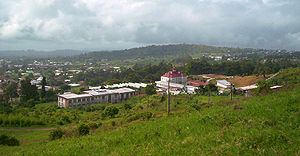The Africa Travel Association says its 38th Annual World Congress will take place in the English speaking Southwest region of Cameroon, with a focus on Buea, the regional capital, and Limbe, a seaside city.
ATA’s 2013 Congress follows the 20th General Assembly of the World Tourism Organization, currently under way at Victoria Falls, the UNESCO heritage site shared by Zambia and Zimbabwe. Held every two years, the UNWTO General Assembly is the premier meeting of senior tourism officials and private sector top brass from all over the world. The assembly ends on August 29.
Zimbabwe officials say ATA’s decision to hold its annual Congress at Victoria Falls in 2012, and the UNWTO’s choice of Zimbabwe as co-host with neighboring Zambia of its 2013 General Assembly affirm the country as a fast-growing destination for tourism and related investment.
“The future, according to the World Tourism Council, which is the industry body, puts Zimbabwe second only to China as the fastest-growing tourism economy by GDP contribution for the next decade, growing at an annualized rate of 8.2 percent,” Walter Mzembi, Zimbabwe’s minister of tourism and hospitality industry, told the U.S. press corps attending the 2012 ATA congress.
Co-sponsored by Cameroon’s Ministry of Tourism and Leisure, the ATA’s 2013 Congress will be held at the new Mountain Hotel located on the southern slopes of Mount Cameroon, one of Africa’s highest peaks and largest volcanoes.
Typically, attendees are tourism ministers, industry experts representing tourism boards, tour operators and their product development executives, front-line agents, ground operator companies, airlines and hotels. Participants from the travel trade media and the corporate, nonprofit and academic sectors are also expected to attend, along with African Diaspora representatives and ATA’s Young Professionals Program participants.
Tourism prospects are bright for Africa, where the sector is projected to have a 4 percent to 6 percent growth in 2013.
According to UNWTO’s latest World Tourism Barometer, Africa’s tourism sector enjoyed the second highest growth worldwide in 2012. With 3 million more tourists in 2012, the region exceeded the 50 million mark for the first time, reaching a total of 52 million. Sub-Saharan destinations had a 5 percent increase, with South Africa, the largest destination in the sub-region, reporting a 10 percent growth.
However, the 2012 figures translate to a mere 5 percent share of the world’s total arrivals, and 3 percent in receipts. Africa’s tourism officials grimly acknowledge that they will have to throw their collective weight behind a “Brand Africa” to attract to the continent more of the nearly one trillion tourists who travel the world each year. Calls for concerted, continent-wide promotion were strident at a Tourism Ministers’ Roundtable in Zimbabwe, convened as part of ATA’s 37th Annual World Congress in May last year.
“We need to speak in one voice and in solidarity with one another, during good times, as well as in challenging times. Everyone goes to ‘Africa,’ not just one country, so we need to present ourselves as ‘Brand Africa,’” Mzembi declared at the time.
ATA Executive Director Edward Bergman says Africa’s tourism stakeholders in government and in the private sector view President Obama’s recent trip to Africa as an important opportunity to market Destination Africa to American tourists and investors. “When President Obama stops in Senegal, South Africa and Tanzania, trade, investment and business, alongside development, democratization and Africa’s youth population will be the topics on hand. Tourism intersects with each one of these issues,” Bergman wrote in an article published on africastrictlybusiness.com.
Globally, tourist arrivals grew by 5 percent during the first half of 2013, compared to the same period of 2012, reaching almost 500 million, according to data just released by UNWTO. Growth was above the 3-percent-to-4-percent projection made at the beginning of the year, and is also exceeding the 3.8 percent growth trend of the UNWTO long-term outlook Tourism Towards 2030.
Overall, growth was stronger in emerging economy destinations, up 6 percent, than in advanced economies up 4 percent, maintaining the trend of the last several years.













